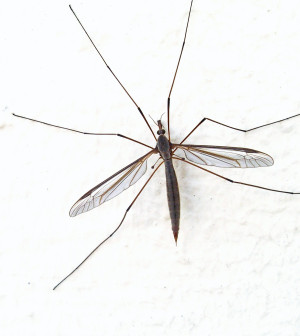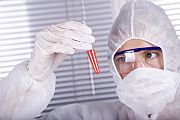- Could Your Grocery Store Meat Be Causing Recurring UTIs?
- Are You Making This Expensive Thermostat Error This Winter?
- Recognizing the Signs of Hypothyroidism
- 10 Strategies to Overcome Insomnia
- Could Artificial Sweeteners Be Aging the Brain Faster?
- Techniques for Soothing Your Nervous System
- Does the Water in Your House Smell Funny? Here’s Why
- Can a Daily Dose of Apple Cider Vinegar Actually Aid Weight Loss?
- 6 Health Beverages That Can Actually Spike Your Blood Sugar
- Treatment Options for Social Anxiety Disorder
Ebola Vaccines May Be Deployed in West Africa by January, Officials Say


A pair of promising Ebola vaccines could be deployed against the outbreak ravaging three West African nations by January, experts say.
Rival American and Canadian vaccines are being prepared for possible use in Guinea, Liberia and Sierra Leone, but first they have to pass expedited human safety trials in the United States, manufacturers say.
If all goes well, inoculation of frontline health workers in West Africa could begin in early 2015.
On Tuesday, a top official from the World Health Organization (WHO) said it’s possible that tens of thousands of doses could be available for “real-world” testing in West Africa by January, the Associated Press reported.
Dr. Marie Paule Kieny, an assistant director general for WHO, said preliminary safety data on both vaccines should be available by December.
Twenty human subjects have already been injected with the American vaccine in one of the safety trials, and by the end of November or early December researchers will know whether it is safe, said Dr. Anthony Fauci, director of the U.S. National Institute of Allergy and Infectious Diseases (NIAID). The agency is developing this vaccine with drug maker GlaxoSmithKline.
“I don’t know if that’s going to be the best one, but that’s the one farthest along in terms of development,” Fauci said.
At the same time, Canada has started shipping its own experimental vaccine to WHO, sending 800 vials for possible use in West Africa.
Those vials are expected to arrive in Switzerland on Wednesday for testing among volunteers in Geneva, Hamburg, Germany, and the African nations of Gabon and Kenya, according to the AP.
“These data are absolutely crucial to allow decision-making on what dose level should go in the efficacy testing in Africa,” Kieny said. “We expect, we hope, to have a go-ahead by the end of the month.”
That would allow the vaccine to be shipped for use in West Africa immediately afterward.
The Canadian vaccine is being produced by the Public Health Agency of Canada and NewLink Genetics, a U.S. firm that holds the license for the vaccine.
The Canadian vaccine has also entered the human testing stage in the United States, with about 40 volunteers at the Walter Reed Army Institute of Research in Maryland receiving a dose, according to Canadian Health Minister Rona Ambrose.
The American and Canadian vaccines appear to be the most promising, in that they are far enough along that they might be put into use during the current Ebola epidemic, said Dr. Craig Smith, medical director of infectious diseases at University Health Care System in Augusta, Ga.
“Both of these vaccines are the top choices for availability and production,” Smith said. “They’re not ready for prime time if it wasn’t an emergency situation, but they are the ones the World Health Organization is supporting.”
The two vaccines both aim to create immunity to Ebola through the use of a simpler, less harmful virus into which Ebola genetics have been spliced, Smith said.
The American vaccine uses a chimpanzee cold virus, called chimp adenovirus type 3, to deliver Ebola genetic material to human cells. The Canadian vaccine uses a virus common to cattle and horses called vesicular stomatitis virus (VSV), which is in the same viral family as the rabies virus but causes only flu-like symptoms in infected humans.
The goal of both vaccines is to trigger an immune system response that creates antibodies that will defend the body against Ebola infection. Both have shown promise in animal trials.
There are several other Ebola vaccines in development. Researchers at Thomas Jefferson University in Philadelphia have developed an Ebola vaccine that piggybacks on the established rabies virus vaccine, for example.
But the other vaccines are not likely to be ready in time for this epidemic. “It’s not that they aren’t good, it’s just that they aren’t farther along in development,” Fauci explained.
It’s an open question whether any of these vaccines will be available in time and in large enough quantities to do any good.
Alan Barrett, director of the Sealy Center for Vaccine Development at the University of Texas Medical Branch, said that even with a revved-up testing schedule, “having a vaccine that would have an effect on this epidemic is unlikely. It’s just not going to be ready in time.”
But if the epidemic is still raging into early 2015 and the vaccines prove safe, Barrett said health care workers likely will be the first people in West Africa to receive inoculations.
“Clearly, you want your health care workers immunized, because otherwise they can’t help those who are ill,” he said.
Which people next receive the vaccine will be a matter of both scientific and ethical debate, Barrett said. The vaccine must be used in a way that can prove its clinical effectiveness, but with thousands dying it may be difficult to stick to such standards.
WHO likely will use a technique called “cluster randomization” to test the effectiveness of Ebola vaccines, Smith said.
“As the vaccine becomes available, you vaccinate everyone in one village, and then compare their progress to that of other unvaccinated villages,” he said. “That way, you’re not using placebo. If you go in to vaccinate a village, they know that they are all going to get the vaccine.”
Smith said this type of clinical trial is not commonly used “because placebo control studies are the gold standard,” but it would likely need to be used in the face of a deadly epidemic.
More than 4,500 people have already died from the Ebola virus, and public health experts have said there could be 10,000 new cases a week by the end of the year if stronger measures to fight the often deadly virus are not taken.
More information
Visit the U.S. Centers for Disease Control and Prevention for more on the Ebola virus.
Source: HealthDay
Copyright © 2026 HealthDay. All rights reserved.










